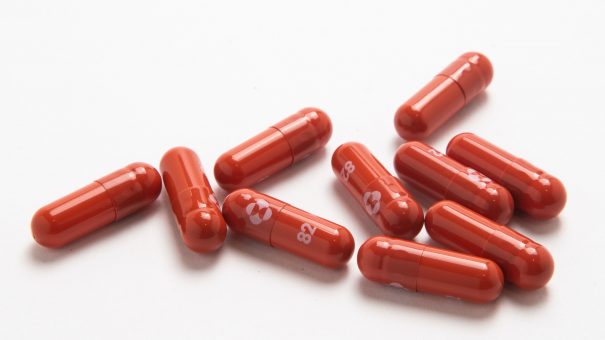Expectation Poor Match for Reality
"The benefits here are pretty substantive [Merck pharmaceutical's COVID oral drug Molnupiravir].""I think they're pretty substantive from an economic point of view and they're substantive for the patients who are older [with fewer experiencing extreme symptoms, hospitalized and dying from COVID]."Dr. Eliav Barr, chief medical officer, Merck Pharmaceuticals, New Jersey"That [impression that molnupiravir curbs the number of people dying or being hospitalized] cannot be supported any more.""If you combine all the results from Panoramic and Merck's MOVE-OUT trial, there is no significant effect.""It just doesn't work."Dr.Andrew Hill, pharmcology researcher, University of Liverpool"A UK study has found that Merck & Co’s oral COVID-19 therapy Lagevrio was unable to reduce hospitalisations compared to placebo in patients at higher risk from the virus, adding fuel to assertions in some quarters that its authorisation was premature.""The 25,000-subject PANORAMIC trial conducted by researchers at Oxford University looked at the addition of a five-day course of Lagevrio (molnupiravir) to standard care in people aged over 50, or adults aged 18 and over with conditions that raised their risk of severe COVID-19, comparing it to standard care plus a placebo on all-cause hospitalisation/death within 28 days.""Preliminary results show that, while Lagevrio hastened the time to recovery from COVID-19 by around six days, it was no better than placebo at keeping patients out of hospital."

Results published online a week ago of the Oxford University0\-led Panoramic trial compared two arms of about12,500 patients in the United Kingdom who were given the usual medical care along with molnupiravir, or just the usual care, saw a lowered rate of deaths and hospitalizations -- the primary end point -- reflected similar outcomes in both groups.
Patients who received the drug reported their symptoms resolving on an average of 4.2 days earlier and requiring fewer doctor appointments. As well, in a sub-group of subjects, the viral load among molnupiravir patients after seven days was lower than a control group. Of those given the drug the majority received at least an initial vaccine dose while 94 percent had been triple-vaccinated.
The Panoramic study also indicated that patients over age 80, along with heart disease and diabetes patients were less likely to die or end up in hospital, on the drug. Yet, patients with compromised immune systems fared better in the non-drug group -- leading study authors to conclude that "estimates were similar for all subgroups".
Results of the independent trial of the medication cast doubt over the efficacy of the drug. The takeaway conclusion was that molnupiravir performs no better than standard care, lowering the death or hospitalization rate of COVID-19 patients, the entire point of the oral drug. Merck insists that in some older patients with health problems, the pills appeared relatively effective.
The expectation was that after regulatory approval and distribution, making the oral drug available on prescription the pharmaceutical giant along with its partner Ridgeback Biotherapeutics would earn up to $5.5 billion in global sales this year. Its fiercest efficacy critic, Dr. Andrew Hill is of the opinion that judging by the main criteria whether the number of people dying or going to hospital is curbed by the drug, it is a failure.
He points out that the corticosteroid drug budesonide presents similar benefits, for roughly two percent of the cost of the Merck product. The company charges wealthier countries about $900 per course of its oral product. A rival COVID drug, Paxlovid, produced by Pfizer is currently on the market. Last year both these medications surfaced as potential breakthrough treatments in the form of oral medication taken by high-risk outpatients at home, to decrease the burden the virus places on health care.
Initial trial results for molnupiravir indicated a 50 percent reduction in death and hospitalization among patients. When the second half of patient results came in, however, it showed peculiarly enough, that those on placebo actually came out with a better showing. Still the general conclusion was a reduction of mortality and hospital admissions by 30 percent.
 |
"Molnupiravir, a covid-19 antiviral drug bought by the UK government in the amount of 2.23 million doses, is no better than placebo at lowering the risks of death and hospital admission, a pivotal UK trial has found.""Preliminary results released from the Panoramic trial of 25 783 people who were randomly assigned to open label treatment with molnupiravir plus usual care or to usual care alone found no significant difference between the two groups for the primary endpoint of death or hospital admission.1 The study has been published as a preprint and has not yet been peer reviewed.""The UK was the first country to authorise Merck Sharp and Dohme’s molnupiravir (Lagevrio) for the treatment of mild to moderate covid-19 in adults with at least one risk factor for severe illness, in November 2021.2 The European Medicines Agency has still not approved the drug."The BMJ (British Medical Journal)
Labels: COVID, Harm Reduction, Pharmaceuticals, Research


0 Comments:
Post a Comment
<< Home